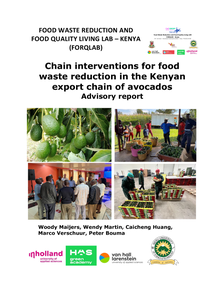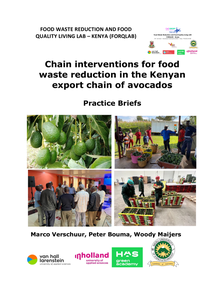The increased generation of food waste is a global and national problem. The purpose of the study is to investigate the factors that influence food waste and the role of technology in tackling food waste in the Netherlands. One of the main findings of the research is food waste is that consumer food waste is mainly influenced by food passing expiry date, food that is left too long in the fridge and consumers buying too much food. In final household consumption, digital platforms and applications enable individuals to share and donate their food, thereby creating awareness on food waste prevention and the environmental benefits.
DOCUMENT
Purpose: Food waste occurs in every stage of the supply chain, but the value-added lost to waste is the highest when consumers waste food. The purpose of this paper is to understand the food waste behaviour of consumers to support policies for minimising food waste. Design/methodology/approach: Using the theory of planned behaviour (TPB) as a theoretical lens, the authors design a questionnaire that incorporates contextual factors to explain food waste behaviour. The authors test two models: base (four constructs of TPB) and extended (four constructs of TPB plus six contextual factors). The authors build partial least squares structural equation models to test the hypotheses. Findings: The data confirm significant relationships between food waste and contextual factors such as motives, financial attitudes, planning routines, food surplus, social relationships and Ramadan. Research limitations/implications: The data comes from an agriculturally resource-constrained country: Qatar. Practical implications: Food waste originating from various causes means more food should flow through the supply chains to reach consumers’ homes. Contextual factors identified in this work increase the explanatory power of the base model by 75 per cent. Social implications: Changing eating habits during certain periods of the year and food surplus have a strong impact on food waste behaviour. Originality/value: A country is considered to be food secure if it can provide its citizens with stable access to sufficient, safe and nutritious food. The findings and conclusions inform and impact upon the development of food waste and food security policies.
MULTIFILE
PurposeFood waste is one of the most challenging issues humanity is currently facing. Therefore, there has been a growing interest in the prevention of food waste because of world hunger, environmental impacts, resource scarcity and economic costs. The purpose of the study is to investigate the factors that influence food waste and the role of technology in tackling food waste in India and the Netherlands.Design/methodology/approachIn order to explore differences in food loss and waste further this study will examine a number of practices on both the production and the consumer side, in a developing country and a developed country with different culture/economic backgrounds: India and the Netherlands. The factors that influence food waste were examined with a preliminary qualitative study, which consists of semi-structured interviews, and quantitative research that comprises a survey. Semi-structured interviews were conducted in both India and the Netherlands, which consists of five interviews. The survey data was collected from 78 individuals from India and 115 individuals from the Netherlands.FindingsOne of the main findings of the research is food waste is divided into waste within agricultural production (i.e. food loss) and final household consumption (i.e. food waste). Different factors influence food loss in different stages in the supply chain. Some of these factors include wastage during processing, storage, transportation and at the market-place. New technologies can utilize food loss for new purposes, so food loss is reduced to the minimum. Food waste is mainly influenced by food passing expiry date, food that is left too long in the fridge and consumers buying too much food. In final household consumption, technologies such as digital platforms enable individuals or organizations to share and donate their food, thereby creating awareness on food waste prevention and the environmental and ethical benefits.Originality/valueThe authors examine to what extent and in which ways supporting consumers to minimize food waste can be achieved via three stages: (1) understanding and evaluating food loss and waste, (2) identifying the factors that influence food loss and waste, (3) understanding consumer behaviors to encourage food waste reduction and (4) identifying the technological impact that would reduce food waste. As such, this paper contributes to ongoing debates about food waste by looking at the role of context and culture and by exploring differences between developed and developing countries. Also, the authors advance the debate by exploring both the role of advanced technology such as blockchain and drones in both preventing loss and waste as well as non-technological mechanisms.
DOCUMENT
Reducing food waste at the consumer level is a critical component of the U.N. sustainable development goals, yet consumer behavior in this domain remains complex and multifaceted. This study extends the Theory of Planned Behavior (TPB) to develop a comprehensive model of food waste behavior in a developed economy, integrating both cognitive and structural factors that influence consumer decisions. Using survey data from 309 U.S. households, we empirically test the impact of retail strategies, perceived utilitarian food waste benefits, and holiday habits on food waste behavior. The findings reveal that retail strategies, such as promotions and packaging tactics, encourage over-purchasing, contributing to increased waste. Additionally, consumers who perceive benefits in discarding food–such as making space for fresher items or avoiding the effort of meal planning–exhibit higher food waste tendencies. Seasonal consumption patterns further amplify waste, as holiday-related shopping habits drive excessive food acquisition. These results underscore the need for interventions that address both individual decision-making processes and broader market-driven influences. By integrating structural and habitual determinants into the TPB framework, this study enhances the theoretical understanding of food waste behavior and offers practical implications for policymakers and retailers seeking to reduce consumer-level food waste.
LINK
This study proposes a systematic value chain approach to helping businesses identify and eliminate inefficiencies. The authors have developed a robust framework, which food-sector entrepreneurs can use to increase profitability of an existing business or to create new profitable opportunities. The value chain approach provides win-win opportunities for players within the value chain. To test the robustness of the framework, the authors use food waste as an example of a critical inefficiency and apply it to two different food sector business cases, each operating in diverse conditions. Because the suggested framework addresses the core elements and parameters for the existence and competitiveness of a business, the model can be adapted to other sectors.
DOCUMENT

The EU-28’s food service sector generates excessive amounts of food waste. This notwithstanding, no comparative, cross-national research has ever been undertaken to understand how food waste is managed in restaurants across the EU-28. This study contributes to knowledge by presenting a first attempt to conduct a comparative analysis of restaurant food waste management practices in the UK and the Netherlands. It finds that although restaurateurs in both countries use demand forecasting as a prime approach to prevent food waste, forecasting does not always work. When this happens, food waste management programmes such as repurposing excess foodstuffs, redistribution of surplus food and consumer choice architecture are mostly considered commercially unviable. To improve the effectiveness of food waste management in the food service sectors of the UK and the Netherlands it is necessary to ensure that food waste mitigation becomes a corporate target for restaurateurs and the progress towards its achievement is regularly monitored by top management. This corporate commitment should be facilitated by national policy-makers, but also by EU regulators, by raising consumer awareness of food waste, incentivising surplus food redistribution and enabling food waste recycling.
LINK
The focus of this paper is on the generation of food waste by small and micro restaurants, specifically on the perceptions of representatives of these restaurants. Do they perceive this generation of food waste as problematic, and do they perceive that they have enough knowledge about how to minimize this generated food waste? With data from a sample of 200 Dutch restaurants, which were collected through surveys and analyzed with regression analysis, we came to two key findings. The first key finding is that our respondents hardly perceive the food waste that is generated in their own restaurant as problematic. The second key finding is that they perceive they have limited knowledge about how to minimize the food waste that is generated in their own restaurant. The main influencing factor for both perceptions appeared to be the actual level of food waste generated in their own restaurant. This paper continues with a number of recommendations for future research, to apply other research techniques and to study other sectors as well. The paper ends with practical recommendations for the representatives of the small and micro restaurants, as the findings of this paper suggest a need for targeted educational and training programs to enhance food waste management in their restaurants, contributing to broader sustainability goals.
DOCUMENT

This paper provides a management perspective of organisational factors that contributes to the reduction of food waste through the application of design science principles to explore causal relationships between food distribution (organisational) and consumption (societal) factors. Qualitative data were collected with an organisational perspective from commercial food consumers along with large-scale food importers, distributors, and retailers. Cause-effect models are built and “what-if” simulations are conducted through the development and application of a Fuzzy Cognitive Map (FCM) approaches to elucidate dynamic interrelationships. The simulation models developed provide a practical insight into existing and emergent food losses scenarios, suggesting the need for big data sets to allow for generalizable findings to be extrapolated from a more detailed quantitative exercise. This research offers itself as evidence to support policy makers in the development of policies that facilitate interventions to reduce food losses. It also contributes to the literature through sustaining, impacting and potentially improving levels of food security, underpinned by empirically constructed policy models that identify potential behavioural changes. It is the extension of these simulation models set against a backdrop of a proposed big data framework for food security, where this study sets avenues for future research for others to design and construct big data research in food supply chains. This research has therefore sought to provide policymakers with a means to evaluate new and existing policies, whilst also offering a practical basis through which food chains can be made more resilient through the consideration of management practices and policy decisions.
LINK
This publication the avocado advisory report which is based on popular papers (practice briefs) of master and bachelor theses and business assignments of students at three Dutch Universities of Applied Sciences: Van Hall Larenstein (VHL), InHolland and HAS Green Academy, and Meru University of Science and Technology in Kenya. All 23 theses and business assignments were commissioned through the research project entitled “Food Waste Reduction and Food Quality LivingLab (FORQLAB)” in Kenya.
MULTIFILE

This booklet presents the practice briefs (popular papers) of master and bachelor theses and business assignments of students at three Dutch Universities of Applied Sciences: Van Hall Larenstein (VHL), InHolland and HAS Green Academy, and Meru University of Science and Technology in Kenya. All theses and business assignments were commissioned through the researchproject entitled “Food Waste Reduction and Food Quality Living Lab (FORQLAB)” in Kenya.
MULTIFILE
